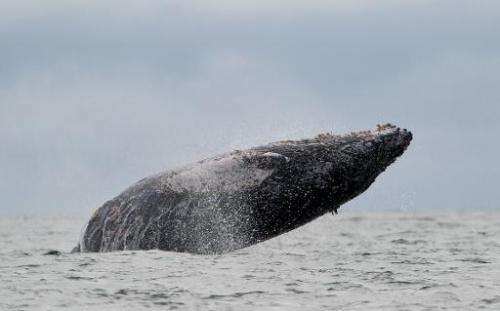Researchers link Australian whale strandings to malnutrition

A surge in humpback whale strandings in Western Australia is believed to be linked to the poor nutrition of the animals, veterinary researchers said Wednesday.
Autopsies of the mostly calf and juvenile carcasses found the whales were malnourished, Murdoch University researcher Carly Holyoake said at a veterinary conference in Perth.
"Post-mortem examination and analysis of the fat content of blubber samples revealed most calves were in an extremely malnourished state," Holyoake said.
"Most had very low blubber fat, which is required for energy, thermoregulation and for buoyancy.
"One individual also had pneumonia which would have made it difficult to breathe and may have contributed to its death."
While there were about two to three humpback whale strandings annually on the west Australian coast between 1989 and 2007, there was a sharp rise in 2008 to 13, the researchers said.
Strandings then soared to 46 in 2009, with a further 16 whales beachings themselves in 2010, while 2011 saw 17 humpbacks—of which 14 were calves and three were juveniles—dying ashore.
Holyoake said the researchers concluded the strandings on Western Australia's southern coast were most likely "due to poor nutrition".
This in turn could be caused by an increase in the commercial fishing of krill—which humpback whales eat almost exclusively in Antarctica—and the impact of climate warming on krill numbers.
Humpback whales migrate annually between Antarctic waters and the Australian coast, making their way north for breeding in warmer waters during the southern hemisphere winter.
But the researchers said some female whales failed to make the journey to Western Australia's north coast before their calves arrived, with many giving birth several thousands of kilometres south of known breeding grounds.
"It's likely that a reduction in the abundance and distribution of feed in the Antarctic may have resulted in longer foraging time which led to a delay in migration times and reduced fat reserves in some pregnant cows," she said.
© 2014 AFP



















